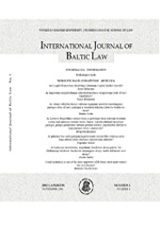Ar lietuvės moterys turi teisę pasirinkti pavardę su vyriškosios giminės galūne?
Do lithuanian women have the right to choose a surname with a male ending?
Author(s): Ramune JakstieneSubject(s): Law, Constitution, Jurisprudence
Published by: Florida Coastal School of Law and Vytautas Magnus University School of Law
Keywords: lithuanian; women; right; choose; surname; male; ending
Summary/Abstract: DO LITHUANIAN WOMEN HAVE THE RIGHT TO CHOOSE A SURNAME WITH A MALE ENDING? The endings of traditional Lithuanian women surnames (-aitė, -ytė, (i)u/ūtė, -ienė, -(i)uvienė) identify their marital status. This very specific feature of Lithuania is regulated by the set of laws. In 2003 the State Commission of the Lithuanian Language has passed legislation allowing women to choose the surname with neutral ending, which doesn’t show marital status. But for the past 50 years some women strive to get the surnames with masculine ending allowed. The goal in this article is to make a research whether the Lithuanian women can choose husband’s surname with the masculine ending after marriage. The hypothesis is raised that Lithuanian women can’t choose husband’s surname of masculine form after marriage. To prove this several tasks are set: 1) to analyze the existing juristic situation of the issue and its background; 2) to evaluate whether analyzed regulation is in accord with basic human rights principals; 3) to look over the experience of related languages speaking countries; 4) to state the conclusions and make some propositions Description of the article’s structure is as following. The first part discusses whether Lithuania’s legislation gives Lithuanian women the opportunity to choose the husband’s surname of masculine form after marriage. The traditional surnames of Lithuanian women having Slavic origin have formed in the very end of 18 th century. The proposition for women’s surname of masculine form appeared after World War I. But this movement didn’t use juristic means until the very end of 20 th century. The specialists of the Lithuanian language categorically resist to masculine form of women surnames arguing that they will ruin the whole system of archaic language. The result of linguistic and systemic analysis of various national norms with the support of national case law led to the conclusion that Lithuanian women can choose a husband’s surname, but not a surname having masculine form. Second part is concentrated on research whether Lithuanian women have the right in choosing the surname of masculine form. This analysis evaluates whether and to what extent the existing juristic regulation of surname structure is in accord with basic human rights principles: right to a name, right to be free from interference to personal and family life, equal treatment on various grounds. Lithuanian Constitution and various documents of international law are chosen as sources to the analysis: Universal Declaration of Human Rights, International Covenant on Civil and Political Rights, International Covenant on Economic, Social and Cultural Rights, European Convention on Human Rights, Convention on Elimination of All Forms of Discrimination Against Women, Convention on the Rights of the Child. Research shows that analyzed national law norms are consistent with basic human rights principles recognized by democratic societies.
Journal: International Journal of Baltic Law
- Issue Year: 2004
- Issue No: 4
- Page Range: 72-95
- Page Count: 24
- Language: Lithuanian

